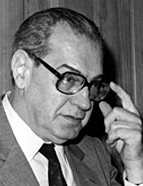

A profound connoisseur of Portuguese historiography, Faoro was an attentive reader of authors such as Alexandre Herculano (1810-1877), Oliveira Martins (1845-1894), Jaime Cortesão (18841960), João Lúcio de Azevedo (1855-1933), Antônio Sérgio (1883-1969) and Vitorino Magalhães Godinho (1918-2011), among others. Based on these authors, he took part of some of the most relevant arguments in Portuguese historiography, such as the debate on whether feudalism existed in Portugal. Like Herculano and Godinho, the author of Os donos do poder argued the feudal model was incompatible with the Portuguese world, stating it was impossible to distinguish any layer of lords endowed with political autonomy between king and vassals. Joining Antônio Sérgio and Jaime Cortesão, he sought to deconstruct the idea that Portugal was a kind of agrarian monarchy. In Faoro's words: "A false observation might suggest that Portugal was an agrarian monarchy that used maritime trade to exchange its rural surpluses. If developed coherently, this doctrine would lead to the maritime route being considered an activity that was peripheral and exterior to the core of the kingdom, based on the idea that — a few leagues from Lisbon or Porto — the people were tending to the fields or grazing, and very far from the sea breeze. The country's unity was loose and there was effective independence between two economic systems. At best, overseas expansion was a fleeting and reckless adventure, a false revolution on the surface, buried in the ruins of a poorly digested empire. "Maritime activity" — Jaime Cortesão would argue — "is not only at the roots of nationality, from where it rises like sap to the trunk — it's also like the bone marrow that strengthens and unites its entire history." (R. Faoro, Os donos do poder… , 2001, p. 66).
In Faoro's view, the history of Portugal holds an indisputable central place in the political and social problems Brazil faced, and made up a long-lasting history that spans six centuries between the reign of King João I and the government of Getúlio Vargas. The essential thesis of Os donos do poder is that the formation of an early absolutist state in Portugal paved the way for the creation of a system tied to patrimonialism and reinforced by the opening of sea routes, which in turn helped to deconstruct the traces of feudal aristocracy. In this context, it wasn't the possession of land that made someone noble, but the positions and roles in state bureaucracy, which led the initially aristocratic estate to become bureaucratised. As a community, the bureaucratic estate acted to preserve its particular interests, which reinforced the patrimonial dimension of the Portuguese state and, by means of historical correspondence, of the Brazilian state. Paradoxically, Faoro stated that the elements that allowed the formation of an early commercial capitalism in Portugal — one that had a political orientation and in which mercantile activities were subordinated to the needs of the state — were the same elements that made it impossible, centuries later, to form an industrial capitalism, under which the independence of the social classes from the state was be an indispensable condition — in contrast with the archaic nature of the Portuguese social structure.
This work is financed by national funds through FCT - Foundation for Science and Technology, I.P, in the scope of the projects UIDB/04311/2020 and UIDP/04311/2020.
